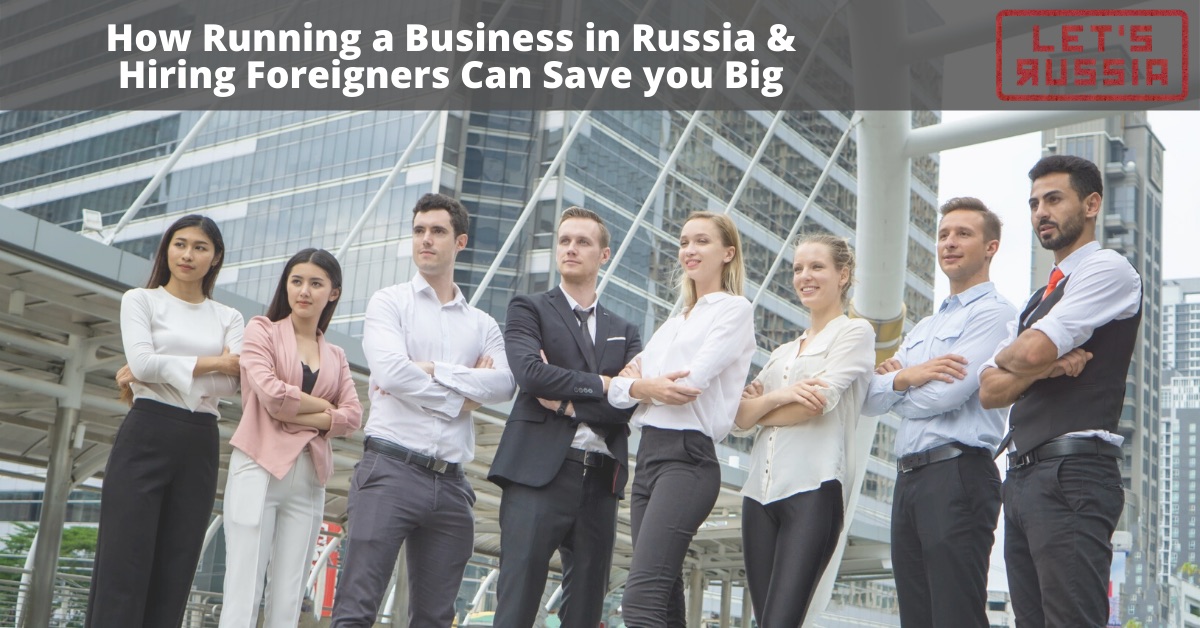How Running a Business in Russia & Hiring Foreigners Saves you Big Money
Moving to a foreign country whose language you don’t speak can be overwhelming and daunting even for daily tasks. Setting up and running a business in a different country is infinitely more challenging. There’s the bureaucracy to push through, legal formalities, cultural differences when hiring personnel and seemingly countless other details to nail down. But what if there was a way to start a business or move an existing business to Russia while avoiding most of the initial difficulties? Now, don’t get me wrong, I’m not saying Russia is the easiest place to start a business when comparing business-friendly countries across the board. However, there are some aspects to Russia that make it a great option for running a business from Russia that are not very broadly known, especially among foreigners.
This article is intended for those who execute a significant part of their work and services remotely. Between the growing number of people working for themselves as consultants, freelancers, online marketers and more and more companies offering their employees opportunities to work remotely, this topic is at its most relevant than ever before. And, of course, this is for those who have an interest in living in Russia or being in some way associated with Russia. Having said that, you can implement these options even if you prefer not living in Russia. Any foreigner is able to establish his or her own business in Russia. Let’s move on to how your business, running from Russia, saves you and your employees money.
Low Income Tax with a Special Work Visa
Russia has one of the lowest income tax rates in the world both for foreigners and locals. It’s the biggest country in the world and it stretches across 11 time zones. Finding a suitable place to live climate-wise and suitable to your lifestyle and personality is quite feasible. For example, if you’re all about business and handle the commotion of life of a metropolis comfortably, Moscow’s definitely a choice. Saint Petersburg has a blend of culture but rather laid back on the backdrop of a big city. Krasnodar and Sochi exhibit warmer weather for those who don’t care for the cold. Other notable cities are Kazan, Ekaterinburg, Novosibirsk, Krasnoyarsk and Irkutsk among others. Even if your main goal is to lower your tax obligations for your business, a Highly-Qualified Specialist work visa (HQS) gives you flexibility to travel to and from Russia with no requirement on how much time you have to stay in Russia.
A low income tax rate attracts foreigners to seek work in Russia, however, there is also a way for an employer to save big on contributions. Under the HQS visa, an employer practically pays 0% into the social benefits pot as long as the holder of the 3-year visa doesn’t have temporary or permanent residency in Russia. And this starts from the day your foreign employee gets his or her work permit in Russia, unlike a typical 1-year work visa which starts off at an income tax rate of 30%. The great thing about the HQS visa is that any foreigner is able to obtain one as long as his or her salary is minimum 167,000 rubles per month.
Converting the minimum salary of 2 million rubles per year for HQS status to US dollars doesn’t yield an exorbitant amount. Nonetheless, you can attract foreign talent not only from North American and Western Europe but also experts from countries with less than favorable standards of living. To put things into perspective, the USA allows 65,000 HB1 work visas to be granted each year. There are many talented employees applying for positions in the United States who do not get a work visa. Those valuable candidates are potentially up for grabs for a similar position in a Russian company.
Any good employer offers its employees additional benefits. In the USA, health care is not only expensive for the employer but also the employee who pays a copay for each doctor’s visit, the medication prescribed and 20%-30% after a deductible. That same business operating in Russia offers similar healthcare benefits with a private policy and both employer and employee pay less overall. Let’s look at how much a US-based company saves by moving its three employees to Russia.
The first employee, the office administrator earns $30,000 per year, the second, a sales rep, earns $70,000 per year and the third, the office director, earns $100,000 per year. Here are the estimated annual costs for the employer per year in the USA.
| BASE SALARY | $30,000 | $70,000 | $100,000 |
| Total FICA, FUTA, SUTA | $3,195 | $7,455 | $10,650 |
| Total benefits | $8,600 | $9,600 | $10,350 |
| Total annual cost | $41,795 | $87,055 | $121,000 |
On the employee’s side, it looks like this:
| BASE SALARY | $30,000 | $70,000 | $100,000 |
| FICA withholdings | $2,295 | $5,355 | $7,650 |
| Personal Income Tax (Federal) | 12.00% | 22.00% | 24.00% |
| Total take home | $24,380 | $50,423 | $70,186 |
If we were to employ the same employees in Russia all on HQS visas, the employer’s costs look like this:
| BASE SALARY | $30,000 | $70,000 | $100,000 |
| Accident Insurance | $60 | $140 | $200 |
| Total benefits | $3,500 | $3,500 | $3,500 |
| Total annual cost | $33,560 | $73,640 | $103,700 |
And employees take home this:
| BASE SALARY | $30,000 | $70,000 | $100,000 |
| Personal Income Tax (Federal) | 13.00% | 13.00% | 13.00% |
| Total take home (w/ FEIE*) | $26,100 | $60,900 | $87,000 |
*FEIE – Foreign Earned Income Exclusion
This is just a rough estimate as there are many factors involved. I factored in $3,500 per year to go towards health insurance, which is generous for Russia. I’m also assuming that the employees’ home country isn’t taxing them or they are applying for the foreign earned income exclusion which means no income tax for US residents up to $107,600 per year.
As you can see, the lowest level employee only saves $1,720 but the employer saves $8,235 per year. Between employee and employer the second employee yields $23,892 in total savings and $34,114 in savings in regards to the third employee. The total savings amount to roughly $67,961 per year. That’s enough to pay a fourth team member. Most small businesses would without doubt benefit from having another talented employee joining the team.
What kind of business does this apply to? If you’re in any digital services or goods industry like developing software, SaaS, mobile apps, digital marketing, social media marketing, digital agencies, online sales, consulting or similar where you sell online, running your business from Russia is possible. Of course, if you’re looking to enter the Russian market with your products or services or start a new business in Russia, this works as well. The language remains the biggest barrier in this case, but you can certainly find highly educated Russians who speak English to assist.
The cost of operating your business surely brings up questions but remember, the Russian ruble is nearly at an all-time low. That means all services, rent, utilities and other related expenses are in rubles and therefore quite cheap compared to what it used to be. A simple class B+ office in downtown Moscow now goes for $500-$1000 per month for 15 to 30 square meters (about 160 to 320 square feet). A small team nestles nicely in there and the office serves as the legal business address, since having one is a requirement anyway. Electricity, water, heating, cell phones, high-speed internet and other services are all much cheaper compared to North America and Western Europe.
Simplified Tax System for Russian Business
The last major benefit I will mention about running a business in Russia is that there are a couple tax systems to choose from to minimize your corporate tax rate. For companies operating with a yearly revenue under 150 million rubles, a simplified tax rate of 6% of revenue is great for businesses with low overhead like service-based businesses. With a higher overhead, you’d want to consider choosing the flat tax rate of 15% after income minus expenses. There are many other strategies to lower your company’s tax burden and you’d be best off speaking to a tax professional who knows your industry.
There are other benefits to operating a business in Russia but these are the main ones as a foreigner. If you’re looking for a different experience and Russia topped your list, Russia may be the place for you and your business or to start a business. You’ll have to do your due diligence based on your situation but once you decide that doing business in Russia is a viable option in your situation, contact us and we’ll help you get started.

